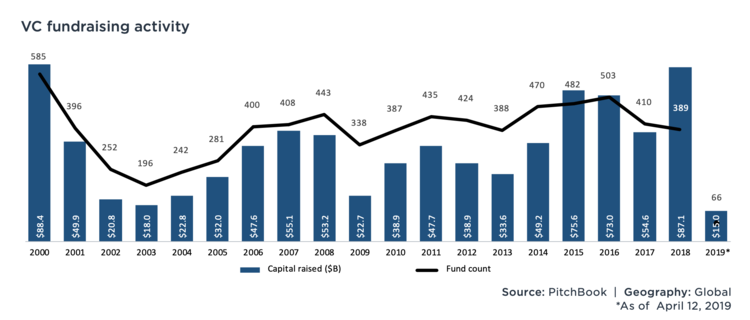
Illustration by Arun Raj Kumar
The novel coronavirus outbreak has become an unexpected challenge for the global economy and businesses. There is no safe place to hide from the consequences caused by “the black swan of 2020.” They are inevitable for each and everyone, in every industry. We should be brave and get ready to put the flexibility of current business models, the professionalism of teams, and the effectiveness of management at test. Companies are bracing themselves for the turbulence of upcoming times.
Some businesses see this situation as a predictable economy collapse, some of them, on the contrary, perceive it as the high time for great opportunities. But, what does await startups? How will they manage to survive a financial crisis? These and other most actual questions we will try to answer backing at the experience of those who’ve already survived past recessions and can shake each others’ hands, being at the forefront of markets today.
What Is the Impact of the Economic Crisis on Startups?

Illustration by Ronak Rathod
Many entrepreneurs share that they expect to see a considerable decrease in startup valuations, as well as total rounds, raised this year. They also predict that coronavirus business impact will ripple wider of what we can see now: a significant drop in business activity, the supply chain issues, and plenty of canceled meetings.
The fundraising market is now slowing down, at least for a while. Partnerships and deals that have seemed to be certain may not close. The sudden lockdown of China has caused massive disruptions in global supply chains. Many companies have faced a need and a challenge to find an alternative supplier.
Nevertheless, many experts admit that the following crisis may appear to be a great chance to start a company that meets the real world’s needs. Coronavirus is predicted to have a severe global impact not only on the economy but also on our values.
Humanity is now motivated to take a fresh look at things that had to be rethought much earlier. We will rethink our politics of consumerism, re-evaluate our priorities, re-manage business processes, and optimize product user experiences for the newly arose market demand. Customer behavior is changing, a competitor landscape is changing, and the industries are already close to experiencing completely new conditions of business survival.
In spite of many negative (and very realistic) predictions, the upcoming time may be fertile for new startups that are ready to throw all their efforts on creativity, customer listening, collaboration, and the ability to be flexible enough at different processes and at any time.
“Many of today’s unicorns have been founded or built during recessions or downturns – resource scarcity can be a source of creativity and pivoting” – Inka Mero, Founder and Managing Partner at Voima Ventures.”
90% of Startups Fail Anyway. Regardless of the Crisis

Illustrated by Uran
Novice entrepreneurs should also keep a simple truth in mind, nine out of ten startups usually fail. And this ratio doesn’t depend on the crisis much since it has always been like this. Most of the business owners may admit that they’ve been ready to write their failure post-mortem before they launch a successful startup.
It’s through mistakes that we can grow. They are unavoidable and even obligatory to start a successful business. Many entrepreneurs’ opinions overlap in four common mistakes that make a startup fail.
Building a product for its own sake, not for customers
Many entrepreneurial masterminds share that they have failed first because they have been focusing too much on building a product and too little on customers. You should find a product for your customers, not customers for your product. The successful product solves the core problems of real people and does it in a genuinely enjoyable way. Don’t spend months drawing plans up. Instead, put your ideas on a business model canvas and go test them with real users.
Misinterpreting the market
Misinterpreting the market means that a business owner underestimates or overestimates expenses, targets the wrong audience, or poorly evaluates the demand. Misinterpreting the market may end a startup before it even starts.
Micromanagement
At the early stage, many startup owners aren’t ready to delegate their tasks to anybody else. Some of them work as a one-person team or take complete control over the employee’s every single action. It negatively influences the processes, as well as the team spirit. Let your business blossom in the hands of professionals that are better than you in specific areas. Allow yourself to focus on your own strengthens and leadership.
Premature scaling
Premature scaling means that you want to get too much too fast. However, good things take time. The primary goal of every startup is to stop being a startup and convert into a full-fledged business with established business models.
Being a good market player also implies being ready to wait for the right moment as for a long time as needed. Hiring full-time employees too soon, for example, may quickly devastate your budget. Alternatively, working with part-timers may make much more sense for small businesses in the early stages.
What Happens to Startups in a Recession
With the stock market volatility, oil wars escalating, and coronavirus playing havoc, the world markets are preparing for tough times ahead, similar to those worst days of trading during a global financial crisis in 2008. However, does it really mean that startups are default-dead?
Many forward-thinking CEOs are now encouraging to think of alternative future scenarios and get ready to survive in the very worst one. Even though it’s probably the time of hard decisions but surely not the time to ignore world-class solutions, even if offered by startups. Armed with crisis management knowledge and driven by excellence and creativity, startups have many chances not only to survive but even pioneer in newly arisen niches.
Experience of the dot-com bubble in 2000 and GFC in 2008
The best we can do is to get back to the learnings of past epochs and match them with our reality. Let’s consider how the financing of startups has changed during recessions.
Angel and Seed Investors
When everyone was waiting for the decrease in seed-funding during the global financial crisis (GFC) in 2008, the situation turned out to be completely different. The number of angel and seed investors remained constant and even started slowly yet stably rising (a dark-blue line on a graph). That’s probably one of the most surprising phenomena of the GFC.

However, why did it happen? In the tough times dictated by the GFC, angel and seed investors were interested in taking a bet for a higher return. And what’s most important – they didn’t see any reason not to invest if they predicted that a startup would stay in-game over a recession. Moreover, many angels invest in a particular startup due to a personal reason, just because they believe in a product. So the primary challenge for startups remained the same as before – to offer something extra-original and valuable.
The only change was not in the number of seed investments but in their amount of funds. It considerably decreased due to some risk-management measures made by investors.
Venture Capital
The situation of VC fundraising was different. During a recession, venture-backed funds significantly decreased. Actually, it has happened twice over the last 20 years, during a dot-com bubble in 2000 and the GFC in 2008-2009. You can see huge drops in investments during these periods on the graph below.

For many startups, it meant tougher competition and struggling for VC investments. That situation also led to increased equity during rounds. Moreover, rounds became smaller than on average. That tricky time required startups to become even more creative innovators and cautious strategic thinkers to prove themselves and get funding.
To be a startup has never been easy. The enduring success depends only on your ability to turn a challenging situation into an opportunity and be highly adaptable to all the changes. An economic recession is not all about massive failures. You should always be open to new approaches, ideas, and industries for launching a startup during a recession.
Many iconic brands have been forged during the most challenging times. The giants, Google and PayPal, significantly strengthened their positions after the dot-com bubble in 2000. While Airbnb, Uber, Pinterest, Slack, Square, and Stripe were founded during the Global Financial Crisis in 2007-2009.
While their competitors feared failure, didn’t want to challenge themselves and enter the market during a volatile time, these companies did it anyway.
Crisis Management for Startups: How to Keep Your Head Above The Water

Illustrated by Dmitrii Kharchenko
COVID-19 has already affected all industries. It takes businesses throughout many learnings, attempts, and innovations. The financial recession will challenge existing business models, standards, and approaches. Here we have compiled a checklist of practices and recommendations that will help startups during a recession.
Communicate very clearly with all the parties
Transparent, concise, and open communication is the foundation of successful collaboration on the project, particularly during a crisis. Keep a weekly dialog with your investors and board. Be upfront with upcoming problems and suggest your solutions. Communicate very clearly and leave no space for any presumptions or misunderstandings.
If it is time for challenges, then we should meet them with dignity and humanity. You may need to hold critical discussions about cutting spending or taking radical measures with your customers, so do those tough calls showing empathy for these people.
Take care of your team. Keep everyone updated with the company’s plan of action and show them that you can lead them through all this.
Tune your business model
This period will require your team, investors, and customers to be as flexible as possible. You will need to rethink your existing business strategy, make additional research to make sure your product will find a perfect market-fit, target a specific cash burn rate to extend your runway, and timely inject your plan with required adjustments.
Get also ready for some delays in financing a project. It’s high time to start an honest conversation with your investors and ask them for collaboration and support.
Craft the funding solution with investors
Your company will need to craft a new, more realistic strategy and discuss it together with your existing investors. You will definitely need their backing. Create a funding solution for existing customers to extend the funding base more easily.
In case if the consensus with investors in not reached, we’d recommend reviewing and cutting off a significant part of spending asap. You can also start seeking immediate support from customers, partners, and new investors.
Take necessary actions quickly
It is essential to ensure a runway, act quickly, and stand by your decisions. You may need to make the following fast adjustments:
1) immediate freeze of hiring new employees
2) cut all the non-critical expenses
3) re-evaluate reasons why you’ve lost your recent customers
4) review sales pipelines
5) rethink your budget and make sure you’ll be able to survive at least the next 12 months
6) think of new, maybe even radical, ways to ensure that new customer will receive the best results
7) take the needed measures to make sure that your team members stay healthy and work effectively.
Demonstrate strong leadership and maintain employee morale
Today, companies are focused on how to tackle the ongoing COVID-19 crisis and the subsequent recession. However, you shouldn’t also forget to emphasize a team spirit and ensure that everyone in a team is informed about what’s going on with the company he or she works at.
Keep employees updated about your company’s most recent plans, urgent decisions, and a general strategy to prevent a team from panics, fear, and any other kind of psychological discomfort. Now, it’s particularly important for your team leaders to demonstrate strong leadership and maintain employee morale.
Conclusion
At the moment, coronavirus precautions and the following consequences require businesses to switch into a survival mode. This time is challenging for all companies, although startups may be at particular risk. It’s difficult to predict the trajectories of growth and development for every type of business in every industry.
The only thing we know for sure – we’re entering the new age of innovations, high adaptability for changes, and increased speed at all stages and processes. And the leadership will remain with those who are in full readiness to be flexible, quickly adapt to new rules, and timely optimize all the processes.





